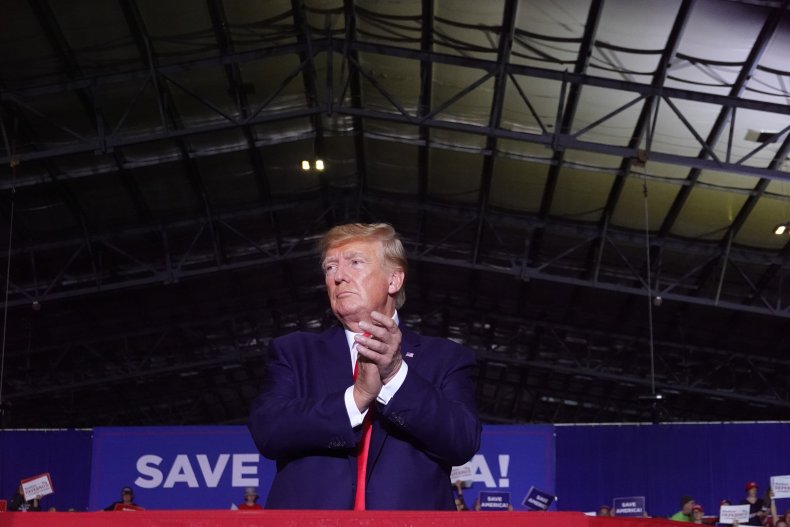Former President Donald Trump said on video that he had not won the 2020 election after claiming for over two years to have been the rightful winner.
Trump made the comment during an interview published Monday by The Atlantic with a group of historians working on a book about his presidency. During the interview, Trump defended the legacy of his sole term in office. His claims that the 2020 election was stolen continue to shape U.S. politics.
The 45th president gave an interview to a panel of historians convened by Julian Zelizer, a Princeton professor and editor of the forthcoming The Presidency of Donald J. Trump: A First Historical Assessment. Writing in The Atlantic, Zelizer said that after Trump learned about the scholarly book he reached out to its authors hoping to offer his perspective on his presidency.
During part of the interview when he was discussing his attempts to get South Korean President Moon Jae-in to pay more for U.S. military support, Trump said: "when I didn't win the election, he had to be the happiest..." before revising his comment to suggest that Iran, China and Russia might have been happier.
Such a comment on the election would appear to contradict his repeated claim that he was the rightful winner of the 2020 presidential vote. However, elsewhere in the interview, Trump referred to the 2020 election as being "rigged and lost."

Former President Donald Trump recently admitted to losing the 2020 election in an interview with 'The Atlantic.' Pictured, Trump speaks to supporters at a rally on April 2, 2022, near Washington, Michigan.SCOTT OLSON/GETTY IMAGES
Trump's interview with the historians took place over Zoom in July 2021, after the former president had spent the first half of the year claiming the election was marred by widespread voter fraud and that he was the rightful winner. A video of the interview has since been shared on Princeton University's library website.
Liz Harrington, spokeswoman for Trump, told Newsweek in an email that the former president was sticking to his previous claims.
"President Trump has been very clear that the election was rigged and stolen," she said. "And tens of millions of Americans agree."
In other media appearances, Trump has also made remarks appearing to concede that President Joe Biden won the 2020 election. During an interview on Flashpoint, a religious public affairs show, Trump said, "had we won the election," his border wall with Mexico would almost be complete.
Trump, during the interview with Zelizer, also said the "real story" about the January 6 Capitol insurrection "has yet to be written." He recalled how he had given a "presidential speech" to a "peaceful rally," claiming left-wing infiltrators caused the violence.
Since the insurrection, federal prosecutors have brought charges against hundreds of rioters, some of whom said they acted on Trump's orders. A federal judge ruled last week that Trump likely committed federal crimes in his attempt to overturn the election.
Zelizer described Trump as being unusually concerned about how he would be perceived by academic historians "without any understanding of how historians gather evidence or render judgments." The Princeton professor noted that neither George W. Bush nor Barack Obama had reached out to him to offer their accounts of their presidencies.
"I'm looking at the list, it's a tremendous group of people, and I think rather than being critical I'd like to have you hear me out, which is what we're doing now, and I appreciate it," Trump told the panel of historians.
Trump's staff provided the historians with documents "that portrayed him as a conventional president with a moderate record." During the interview, Trump depicted himself as underrated and pointed to what he described as downplayed successes around the economy, pandemic and foreign policy.
Additionally, Trump told the historians that "nobody was tougher on Russia than me," rebutting criticisms of his praise of Russian President Vladimir Putin. He also said his jabs at NATO allies compelled them pay their share toward the alliance, and pressed South Korean President Moon Jae-In to pay for more his country's defense.
But Zelizer wrote that the interview "underscored common criticisms: that he construed the presidency as a forum to prove his dealmaking prowess; that he sought flattery and believed too much of his own spin; that he dismissed substantive criticism as misinformed, politically motivated, ethically compromised, or otherwise cynical."


